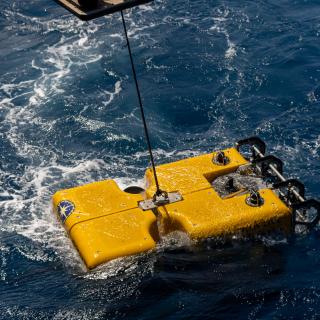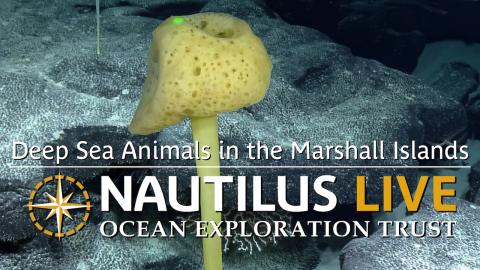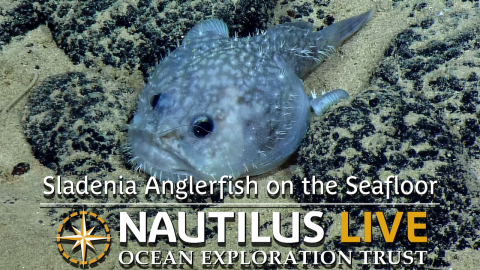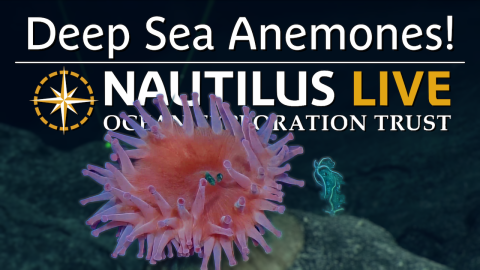Meet Ocean Explorer Kelsey Kroon!

OET proudly welcomes Kelsey Kroon to the Corps of Exploration as part of the Science & Engineering Internship Program. This internship program supports community college, undergraduate, and graduate students in building professional workforce experience and exploring STEAM-related careers that connect to research themes like robotics, ocean science, education, and exploration. Kelsey is joining E/V Nautilus for our NA174 expedition as a video engineering intern.
We sat with Kelsey to learn more about her experience at sea and the path that led her to Nautilus.
Describe your role with OET.
My role is a Video Engineer Intern. I get to make sure the streams all look good with the right cameras being shown at the best times - not only for the live streams but also for the pilots onboard and various other screens throughout the vessel. I get to set the iris and focus for the ROV - the pilots control where the camera points. We have very hand-in-hand roles. The fun part about my position is that I’m learning. I’m a camera operator by trade but broadcast and all the tech that comes with it is completely new to me. This has truly been the career opportunity of a lifetime and I can’t wait to see my own personal growth.
Can you tell us a little about your background? What influenced you as a child?
A few things influenced me growing up. My dad was a tugboat captain and grandad had a personal fishing boat out of Seward so a lot of my childhood was spent on the water. It gave me a love for the ocean that I feel I’ve been lucky to have. I’ve always been curious about the world and wanted to travel, so when I was ten or eleven, my dad made a giant wall map in my room with five red pins to put anywhere I wanted. From there dad explained that travel is expensive and instead of paying to go see the world, I should build a career around seeing it. I think that really set me off onto this whole path.
When you were a kid, what did you want to be when you grew up?
When I was a kid I wanted to be a vet “or anything to do with animals”. I’ve never really loved the medical side of it, I just wanted to observe and be around them more than anything. An episode of ‘Our Planet’ was shown in theaters back home and we got to go for a field trip when I was in second grade. Seeing the BTS of the camera operators was my first look at a career dream - but I never thought I could get into it. It wasn’t until reconnecting with my childhood friend Erin Ranney did I ever think it would be possible for me.
What would you consider to be your greatest challenge entering this field?
The greatest challenge for entering this field? It’s so competitive and full of the most incredible humans you could ever meet. Learning the components of cameras and cues for filming comes with time - and a lot of patient mentors. It’s finding the right job openings and people to teach you that’s the hard part. It’s a career of networking and selling yourself and that is really hard without family and friends who root you on and mentors who take the chance with you. I took a chance by taking a computer based logistics job in Antarctica so I could go out in my free time taking photos and videos of penguins and seals there. The job wasn’t at all in my dream field but I took the time to go and that truly was my first big break - it helped me get into the Wildlife Filmmaking Masters program at UWE and from there my career has grown into this dream role of ROV work. This is truly the career of slow and steady wins the race. Don’t compare yourself to anyone else’s journey - you’ll be surprised on the other side to see no one has had the same one.
Do you have any advice for someone looking to follow a similar path?
For someone trying to follow the same path I can really only recommend to make short edits and films - and doing it on your phone is more than fine. Everyone thinks you need the best biggest camera to make it and you really don’t. Start making a portfolio on social media and post everything - it’s cool to see your growth over time all in one place. Plus, it’s nice to have your calling card out there so simply. The other bit of advice is to never take yourself too seriously. It’s fun (and cool I think) to be constantly learning. If you open yourself up to being wrong and even just listening a little bit longer to what so many others have to say you’ll grow more than if you try to force your way in. Being kind, fun, and patient will take you much farther than anything else.
What's next for your ocean studies and career?
I suppose next in my career is to try and keep at it in the ROV world. I’ve always loved boats and being on the water and filming is my passion so I can’t see anything fitting in my life more perfectly. I’ll be applying to try and stay on Nautilus next season as well as other ROV/research vessel based jobs around the world and hope something connects with my life and schedule. In the meantime it’ll be as much marine debris art making and documentary filming as I can find!

Deep-Sea Habitats of the Marshall Islands
The Republic of the Marshall Islands is an atoll-based country of over 1,200 islands surrounded by 2.13 million square kilometers of ocean, the vast majority of which has never been mapped or surveyed.



